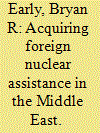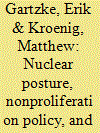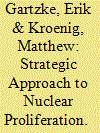|
|
|
Sort Order |
|
|
|
Items / Page
|
|
|
|
|
|
|
| Srl | Item |
| 1 |
ID:
096499


|
|
|
|
|
| Publication |
2010.
|
| Summary/Abstract |
The United Arab Emirates (UAE) has laid out an ambitious plan to become the first Arab country to possess a civilian nuclear energy program. Central to that effort has been the Emirati government's ability to obtain foreign nuclear assistance. This article traces the UAE's strategies for overcoming the obstacles that stood in the way of nuclear suppliers providing assistance. It examines the approach taken by the UAE to assuage the safety and security concerns of nuclear suppliers, how the UAE leveraged its alliances with France and the United States to obtain their cooperation, and its strategies for engaging domestic interest groups in supplier states. The generalizable elements of the UAE's strategies are discussed and used to provide insight into the prospects for other Middle Eastern states' bids to obtain similar assistance. The article concludes with a discussion of the potentially transformative aspects of the strategies employed by the UAE in shaping other countries' pursuit of nuclear energy in the region.
|
|
|
|
|
|
|
|
|
|
|
|
|
|
|
|
| 2 |
ID:
131236


|
|
|
|
|
| Publication |
2014.
|
| Summary/Abstract |
What is the relationship between nuclear postures and nonproliferation policies and the spread of nuclear weapons? At first blush, this might appear to be an obvious question. After all, states go to great lengths-extending nuclear security guarantees to nonnuclear weapon states, forward-deploying nuclear weapons on the territory of allies, sizing their own nuclear arsenals with the proliferation decisions of other states in mind, supporting international institutions in conducting inspections of nuclear facilities in nonnuclear weapon states, restricting the availability of sensitive nuclear technology, applying and enforcing sanctions against would-be proliferators, conducting military strikes against nuclear facilities, and promoting nuclear cooperation for peaceful purposes, among many other steps-to prevent the spread of nuclear weapons. It would be strange to imagine that states pursue such actions unless they can expect a policy payoff in terms of peace or security. Yet, there is little systematic evidence to suggest that nuclear postures and policies have a meaningful impact on the spread of nuclear weapons.
|
|
|
|
|
|
|
|
|
|
|
|
|
|
|
|
| 3 |
ID:
087443


|
|
|
|
|
| Publication |
2009.
|
| Summary/Abstract |
Nuclear weapons have occupied a central role in international politics ever since
their introduction onto the world stage in 1945. The use of nuclear weapons by
the United States on Hiroshima and Nagasaki is widely believed to have compelled
Japanese surrender and brought World War II to a close. The vast nuclear arsenals of
the United States and the Soviet Union were fundamental to the bipolar, strategic
relationship that structured international politics for more than fifty years during the
Cold War. And while many analysts had hoped that the collapse of the Soviet Union
would lead to a reduction in the influence of nuclear weapons in international affairs,
it was not to be so. The threat of nuclear proliferation resurfaced as India, Pakistan,
and more recently, North Korea have conducted nuclear tests. Other regional powers,
including Iran, Iraq, and Libya, are pursuing or have pursued nuclear capabilities.
The terrorist attacks against the United States on September 11, 2001, demonstrated
that if terrorists, intent on carrying out mass-casualty attacks, acquired nuclear
weapons, the results could be catastrophic. The ease with which states or terrorists
could potentially acquire sensitive nuclear materials was exemplified by the black
market nuclear proliferation ring operated by Pakistani scientist A. Q. Khan. Indeed,
in his 2007 annual report to Congress on the projected threats to the national security
of the United States of America, Director of National Intelligence J. Michael
McConnell concluded that nuclear proliferation poses one of the greatest threats to
U.S. national security.1
|
|
|
|
|
|
|
|
|
|
|
|
|
|
|
|
|
|
|
|
|